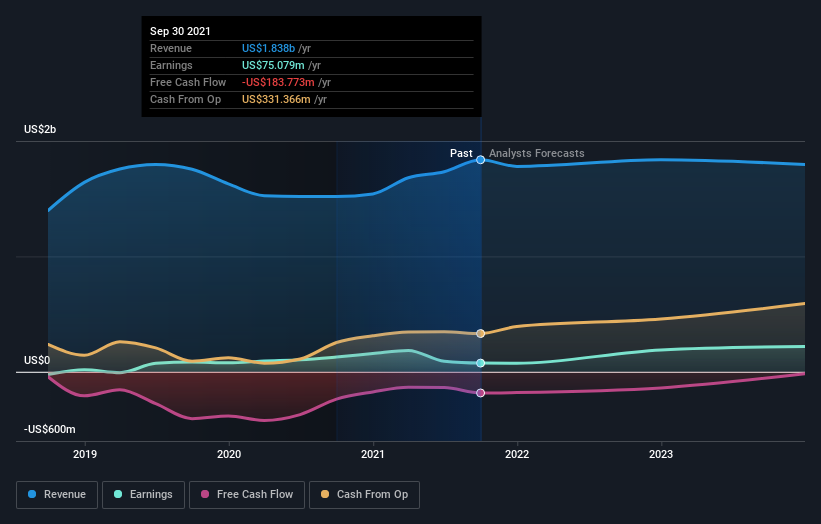Shareholders in South Jersey Industries (NYSE:SJI) have lost 17%, as stock drops 3.1% this past week
For many investors, the main point of stock picking is to generate higher returns than the overall market. But the risk of stock picking is that you will likely buy under-performing companies. Unfortunately, that's been the case for longer term South Jersey Industries, Inc. (NYSE:SJI) shareholders, since the share price is down 27% in the last three years, falling well short of the market return of around 85%. The falls have accelerated recently, with the share price down 10% in the last three months. This could be related to the recent financial results - you can catch up on the most recent data by reading our company report.
Since South Jersey Industries has shed US$75m from its value in the past 7 days, let's see if the longer term decline has been driven by the business' economics.
See our latest analysis for South Jersey Industries
While markets are a powerful pricing mechanism, share prices reflect investor sentiment, not just underlying business performance. One imperfect but simple way to consider how the market perception of a company has shifted is to compare the change in the earnings per share (EPS) with the share price movement.
South Jersey Industries became profitable within the last five years. That would generally be considered a positive, so we are surprised to see the share price is down. So it's worth looking at other metrics to try to understand the share price move.
We note that the dividend seems healthy enough, so that probably doesn't explain the share price drop. South Jersey Industries has maintained its top line over three years, so we doubt that has shareholders worried. So it might be worth looking at how revenue growth over time, in greater detail.
The graphic below depicts how earnings and revenue have changed over time (unveil the exact values by clicking on the image).
It is of course excellent to see how South Jersey Industries has grown profits over the years, but the future is more important for shareholders. You can see how its balance sheet has strengthened (or weakened) over time in this free interactive graphic.
What About Dividends?
As well as measuring the share price return, investors should also consider the total shareholder return (TSR). The TSR is a return calculation that accounts for the value of cash dividends (assuming that any dividend received was reinvested) and the calculated value of any discounted capital raisings and spin-offs. So for companies that pay a generous dividend, the TSR is often a lot higher than the share price return. We note that for South Jersey Industries the TSR over the last 3 years was -17%, which is better than the share price return mentioned above. This is largely a result of its dividend payments!
A Different Perspective
South Jersey Industries shareholders are up 11% for the year (even including dividends). But that was short of the market average. But at least that's still a gain! Over five years the TSR has been a reduction of 2% per year, over five years. So this might be a sign the business has turned its fortunes around. It's always interesting to track share price performance over the longer term. But to understand South Jersey Industries better, we need to consider many other factors. For instance, we've identified 4 warning signs for South Jersey Industries (1 is potentially serious) that you should be aware of.
If you would prefer to check out another company -- one with potentially superior financials -- then do not miss this free list of companies that have proven they can grow earnings.
Please note, the market returns quoted in this article reflect the market weighted average returns of stocks that currently trade on US exchanges.
This article by Simply Wall St is general in nature. We provide commentary based on historical data and analyst forecasts only using an unbiased methodology and our articles are not intended to be financial advice. It does not constitute a recommendation to buy or sell any stock, and does not take account of your objectives, or your financial situation. We aim to bring you long-term focused analysis driven by fundamental data. Note that our analysis may not factor in the latest price-sensitive company announcements or qualitative material. Simply Wall St has no position in any stocks mentioned.
Have feedback on this article? Concerned about the content? Get in touch with us directly. Alternatively, email editorial-team (at) simplywallst.com.

